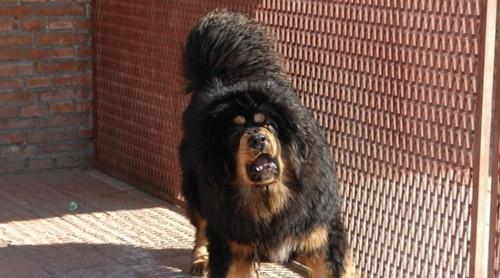
Tibetan mastiff (details)
The problem of biting dogs is not uncommon. Many people first observe the breed of dogs when they see whether dogs bite, but now there are many cases of golden retrievers biting people. Why? Is the gene mutated or the environment changed?
In fact, dog breed is only one of many factors that affect aggression. According to a new research published recently in the journal Animal Behaviour Science, the dog owner, that is, the training method, adoption place, gender and age of the owner have the greatest influence on dog aggression.
Besides, the same dog is fierce in one place, but it may not be fierce in another place. For example, they may scream in the street, but they are gentle in their own backyard. "The causes of dogs' aggression are very complicated, which is related to the problems of' conditional dependence' and' historical dependence between people and dogs'," said Stephen Zawistowski, scientific consultant of American Society for the Protection of Animals (ASPCA). "You can't predict whether dogs are aggressive or not just based on their breeds."
There are several points worth noting in this research on dog aggression:
1. The aggression of "dogs owned by dogs under 25" is almost twice that of "dogs owned by dogs over 40". < br> 2. "The aggressiveness of neutered male dogs" is twice that of neutered female dogs. However, there is no significant difference in aggressiveness between "neutered male dogs" and "neutered male dogs". < br> 3. Dogs that have not been trained in puppy life are 1.5 times more aggressive towards strangers than trained dogs. < br> 4. Training dogs with punishment and negative reinforcement is easy to be aggressive. < br> 5. Dogs obtained from shelters and other sources are more aggressive than those directly purchased from breeders. < br> Stephen Zawistowski reminds young dogs of the importance of socialization, and says that if old dogs suddenly become aggressive, it may be because of illness.
Mary Burch, director of Canine Good Citizen at American Kennel Club, said, "If you are worried about being attacked by an unfamiliar dog, you should pay attention to its body language. Some initial aggressive behaviors are direct staring, stiff posture, hair sticking up, ears or lips pulling back, teeth showing, growling and barking, etc. If only barking, it should not be defined as aggressive behavior. She criticized this British study for treating barking as aggression, "because barking can have many meanings." A dog barking may also remind the owner or send a message, "In my opinion, this defines aggression too broadly."
